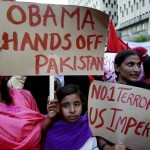Counterterrorism Policy Successful but Misguided
 American Security Project fellow Bernard Finel argues that we need a Counterterrorism Strategy Reboot.
American Security Project fellow Bernard Finel argues that we need a Counterterrorism Strategy Reboot.
He begins with an interesting paradox:
The implementation of the Bush Administration’s counter-terrorism strategy has been more successful than anyone could have expected and yet the threat from violent jihadist groups remains undiminished.
A little more of the same is not, he argues, the answer.






He begins with an interesting paradox: “The implementation of the Bush Administration’s counter-terrorism strategy has been more successful than anyone could have expected and yet the threat from violent jihadist groups remains undiminished.â€
By implementing the wrong strategy (unilateral military action instead of international law enforcement) the Bush administration may have disrupted some organized terrorist cells for a short while but clearly lost ground to the terrorist recruiting and broadening of the base.
I do not see how this can be called more successful that anyone could have expected. I for one expected that Osama bin Laden be brought to justice at least six years ago. As long as he remains free and unmolested by justice the terrorist are winning.
That’s problematic on two grounds. First, while capturing or killing OBL would be demoralizing to the terrorists and perhaps hinder recruitment, it would have little long-term impact on terrorism.
Second, and more importantly, “winning” is defined by achieving political objectives. By all their own announced goals, al Qaeda is further from doing that than they were in 2001.
I’m deeply conflicted about Dr. Finel’s prescriptions. While I generally have sympathy for what I think is the thrust of his argument (that we need to change our strategy), I disagree with both elements of his alternative.
The first element presents an intractable problem. In the current political situation here and in the world there’s nothing we can do about ungoverned territories.
As far as the second element goes, I’d love to debate the following proposition with Dr. Finel:
Resolved: the U. S. should disengage from the Middle East
He can take the affirmative; I’ll take the negative. I don’t think the argument can be made. On the other hand I do think that we need to engage with the countries and people of the Middle East in a different way. We need to reduce our military footprint (or at least our profile) and increase our economic and diplomatic engagement with the region.
If that isn’t what he’s suggesting in the post you linked, perhaps he should specify what he does mean a little more precisely.
Dave: I’d be delighted to debate… shall we put together a debate for posting either here or at glittering eye?
I’ll write up my affirmative case shortly with some additional details.
It was the correct strategy.
As Pakistan’s current situation points up so very well, law enforcement i these situations is of questionable value since the law enforcers are of questionable loyalty and varied motivations… which usually do not mesh with with the people writing the laws or calling for them to be enforced.
Sounds good to me, Bernard. We’ll do it here. Lincoln-Douglas format?
It had some good points and some bad points. There were implementation issues. Welcome to the real world.
There are some instances where military force is clearly called for. Attacking Al Qaeda in Afghanistan and deposing the Taliban was one.
Fooling ourselves into thinking we can ride in on magic ponies and reshape ancient cultures to our liking is not serving us. Invading Iraq was a vast mistake.
Does law enforcement have a role? Sure. But it is not “the answer”. There is no single answer. One thing we need to do is move swiftly back to the rule of law in this country. We need to close Gitmo, ASAP. It is a terrorist recruiting poster.
We need to take a harder look at understanding the people we are fighting. Just reading Sun-Tzu and applying some of those lessons would take us a long way.
Sun Tzu taught his men to “know your enemy” before going into battle. For if “you know your enemy and know yourself,” he wrote, “you need not fear the result of a hundred battles.” But, Sun Tzu warned, “If you know yourself but not the enemy, for every victory gained you will also suffer a defeat.”
And apparently counterinsurgency strategy says it would take 600,000 troops to pacify Afghanistan. So yeah, we’re pretty much boned there, and if Obama is smart he’ll get out pronto.
I don’t think he’s implying that we need to cut ourselves off from the Middle East – we just need to cut our imprint and politicking in the area. I kind of agree with that; I think if we had some more “distance” from the region, we could deal with it on the basis of our own interests much more effectively.
I do think he’s wrong, though, about a US role in the peace process. In fact, I think that the only way you might ultimately end up with a Palestinian and Israeli state existing side-by-side without Lebanon-style bickering and small conflicts is if there is a force interposed between them.
At the time I agreed. But now I see it was a mistake. It doesn’t appear that we can keep the Taliban down at any reasonable price. It does appear that we could have gotten bin Laden and his group–which is a separate, if somewhat overlapping group than the Taliban–at one point, years ago. In hindsight that’s what we should have limited ourselves to. Not that I blame anybody for failing to understand that, I certainly didn’t understand that at the time. I didn’t even know that Afghanistan has more people than Iraq. But we can’t take and hold the entire country with anything less than a vietnam-sized effort, another decade, and thousands of US dead. If that even worked in the end. I don’t think that’s worth it. They made the cost too high for the British occupation, they made the cost too high for the Russian occupation, and now they’ll make the cost too high for the American occupation. We need to realize that and drop the goal of occupation. Trying to get the best Intel we can and taking out the rather tiny terrorist groups is the best strategy.
Hear hear!
The idea that the president should be allowed to do anything he wants to the citizens in the name of protecting the Homeland is music to fascist ears.
I guess people like Anjin have a deeper understanding of all the good accomplished by Saddam Hussein. After all it was a mistake to remove him from power. His intent was not dominance of the Middle East or the power that would come from control of the worlds oil supply. He was attempting population control by murdering millions of his and other peoples. Kind of like Hitler, huh Anjin? Count the number of times the U.S. has been attacked since Bush took action. I do not know how other policies would have worked but when something works, don’t fix it. Pretty f**king simple. This so called war on terrorism is really a war with the spread of Islam. Ignorance of their goals only assists them. Bush was absolutely right. Fight them there or fight them here. People like Anjin are not capable of understanding this because they buy into the idea that America is wrong. Men have died so idiots like that can express their faulty opinions openly. Too bad.
Saddam Husein was never our problem. He never bothered us or any of our allies.
If his goal was to control the middle eastern oil fields well then so what? It doesn’t matter who we buy oil from. And if refused to sell us oil, again, so what? Let him choke on it long enough and he’d start selling again.
So we’re basing our measure of success on the insane ramblings of our lunatic enemies? Lovely.
And here we have in a nutshell, what III really thinks of America. It is too bad people have the right to disagree with him.
Bubba, you are closer to ol’ Saddam than you realize…
Most of these ME people are trapped in centuries old tribal networks, tribal laws or rules, and the whims of the tribal leaders. There appear to be hundreds of tribes spread over Iraq, Iran, Syria, Jordan, Palestine, Lebanon, Egypt, Yemen, Somalia, and all points nearby.
They are loosely coupled by ancient inter-tribal loyalties, a variant of Islam and some form of Sharia, and they all seem to have a plentiful supply of AK-47s, RPGs, ammo, and explosives. The Brits managed to hold some of it together, sort of, for 40 years or so, but in the end, tucked their tails and ran.
We appear to be following the Brit’s pattern, only much faster, possibly because we tried to instill some form of democracy into the tribal mishmash without first fully conquering the entire lot, and then setting up a viable (only mildly corruptible) administration and civil service. We are out of Iraq in 2011-2012, and one wonders how long after that the Iraqi government falls apart, to the delight and support of Iran.
This leaves a lot of open questions to ponder:
1. Do we go back in to support Iraq against Iran?
2. Do we have to defend little Kuwait once more against the big guys above them?
3. Will we allow Saudi Arabia to be overrun by some alliance of Iran, Syria, Palestine, Iraq(?), or whomever?
4. Will we defend Israel against the alignment of nations against it?
5. Will we allow Nuclear Weapons in the hands of Iran?
6. What would we do if Iran torched off four or five nukes in Israel, virtually wiping it off the map?
7. If our some 16% of oil imports are cut off from the ME overnight, what would we do about it?
One can dream up many scary scenarios that could come about because we might be essentially shoved out of the ME militarily, not by combat defeat, but by the twin disasters of internal US liberal/socialist politics and an empty treasury.
High-sounding phrases about getting along together may end up instead being we bowing our heads and accepting others’ dictates.
So, you speak for America?
Kuwait may have something to say to that.